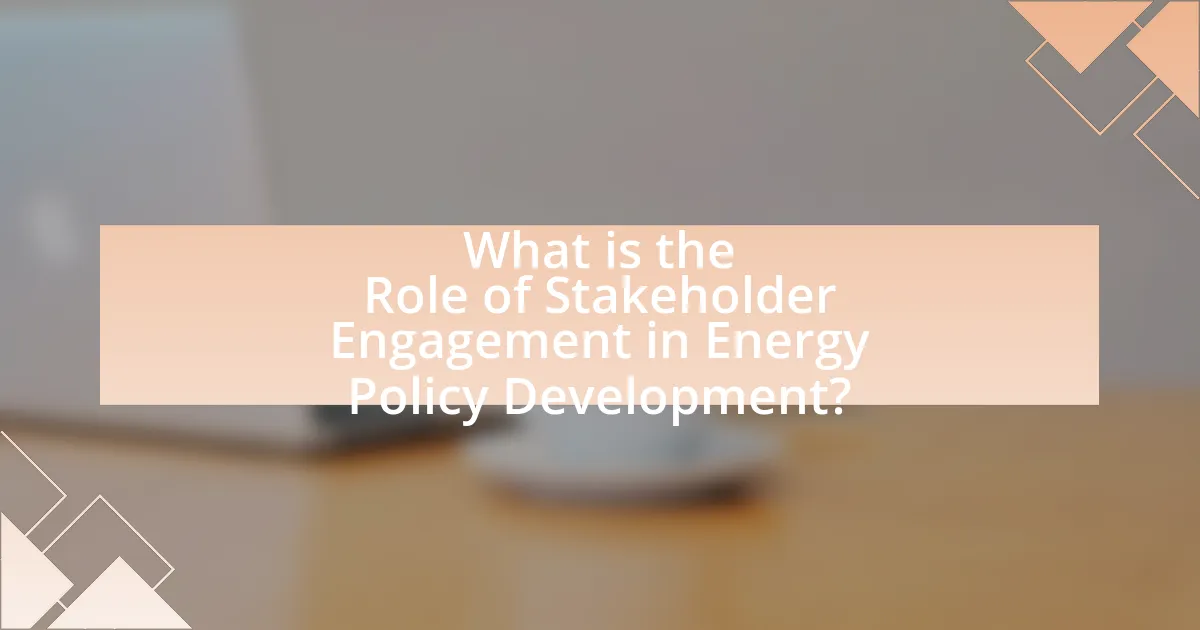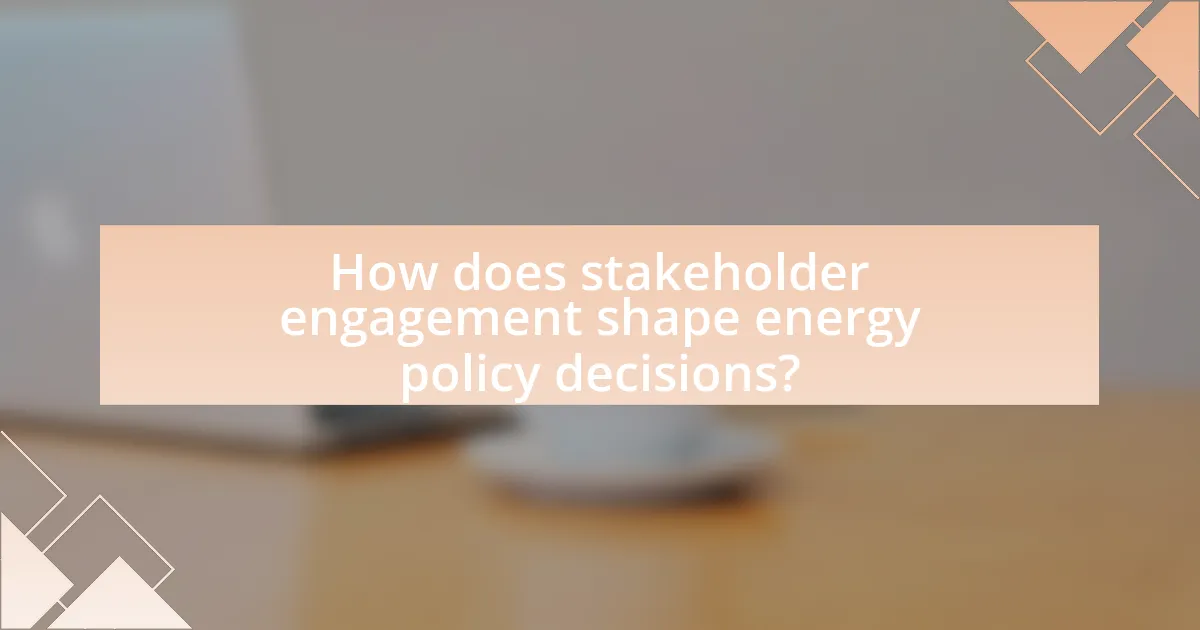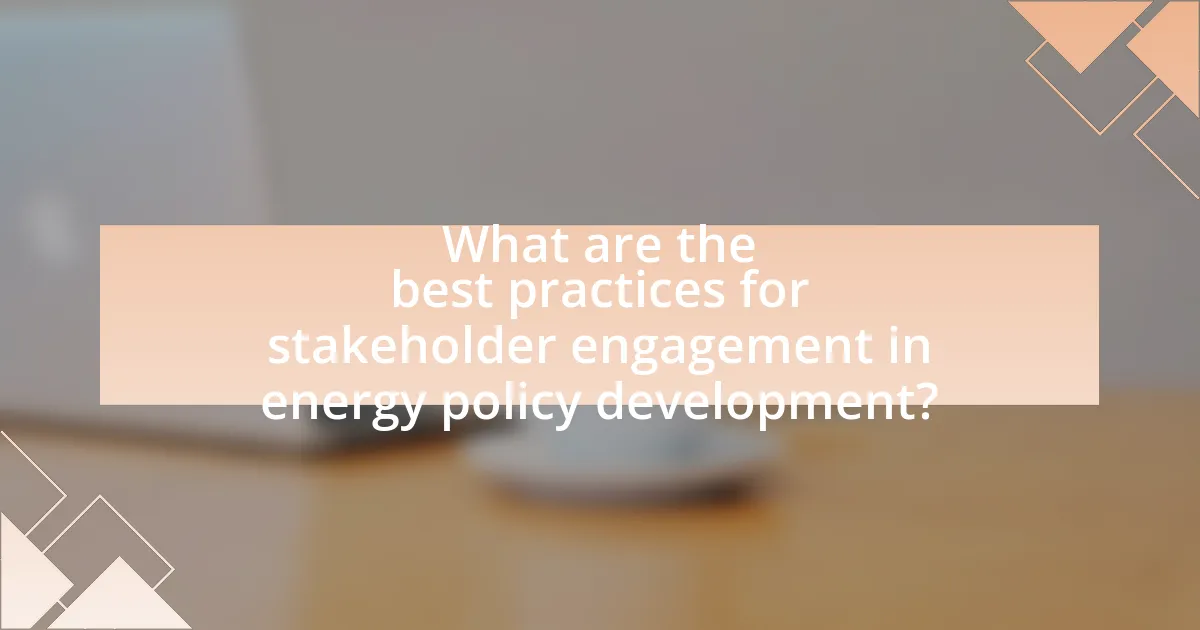The article focuses on the critical role of stakeholder engagement in energy policy development. It highlights how inclusive processes that involve diverse stakeholders—such as government agencies, industry representatives, and community members—lead to more effective, equitable, and sustainable energy policies. Key methods of engagement, including public consultations and collaborative workshops, are discussed, along with the benefits of transparency and trust in enhancing policy legitimacy. The article also addresses challenges in stakeholder engagement, such as conflicting interests and resource limitations, while providing best practices and case studies that exemplify successful engagement strategies in energy policy initiatives.

What is the Role of Stakeholder Engagement in Energy Policy Development?
Stakeholder engagement plays a crucial role in energy policy development by ensuring that diverse perspectives and interests are considered in the decision-making process. This engagement fosters transparency, builds trust among stakeholders, and enhances the legitimacy of policies. For instance, studies have shown that inclusive stakeholder processes lead to more effective and sustainable energy policies, as they incorporate local knowledge and address community concerns. Engaging stakeholders, such as government agencies, industry representatives, and community members, can result in policies that are more widely accepted and supported, ultimately leading to better implementation and outcomes.
Why is stakeholder engagement important in energy policy development?
Stakeholder engagement is crucial in energy policy development because it ensures that diverse perspectives and interests are considered, leading to more effective and equitable policies. Engaging stakeholders, such as community members, industry representatives, and environmental groups, fosters transparency and builds trust, which are essential for the successful implementation of energy policies. Research indicates that inclusive stakeholder processes can enhance policy legitimacy and public acceptance, as seen in the 2015 Paris Agreement, where broad stakeholder involvement was key to its global support.
What are the key stakeholders involved in energy policy development?
The key stakeholders involved in energy policy development include government agencies, private sector companies, non-governmental organizations (NGOs), and the general public. Government agencies, such as energy departments and regulatory bodies, are responsible for creating and enforcing energy policies. Private sector companies, including energy producers and technology firms, provide expertise and investment necessary for energy projects. NGOs advocate for environmental and social considerations, influencing policy through research and public campaigns. The general public contributes to the dialogue through public consultations and feedback mechanisms, ensuring that diverse perspectives are considered in policy formulation. These stakeholders collectively shape energy policy by balancing economic, environmental, and social factors.
How does stakeholder engagement influence policy outcomes?
Stakeholder engagement significantly influences policy outcomes by ensuring that diverse perspectives are considered in the decision-making process. Engaging stakeholders, such as community members, industry representatives, and advocacy groups, leads to more informed policies that reflect the needs and values of the affected populations. Research indicates that policies developed with stakeholder input are more likely to gain public support and achieve successful implementation. For instance, a study by the International Energy Agency found that energy policies incorporating stakeholder feedback resulted in a 30% increase in public acceptance compared to those developed without such engagement. This demonstrates that effective stakeholder engagement not only enhances the legitimacy of policy decisions but also improves their effectiveness and sustainability.
What are the main methods of stakeholder engagement in energy policy?
The main methods of stakeholder engagement in energy policy include public consultations, stakeholder workshops, and collaborative decision-making processes. Public consultations allow stakeholders to provide input on proposed policies, ensuring diverse perspectives are considered. Stakeholder workshops facilitate in-depth discussions among various parties, fostering a collaborative environment for sharing ideas and concerns. Collaborative decision-making processes involve stakeholders in the actual formulation of policies, enhancing transparency and trust. These methods are supported by evidence showing that inclusive engagement leads to more effective and accepted energy policies, as demonstrated in case studies from countries like Germany and Denmark, where stakeholder involvement has significantly improved policy outcomes.
How do public consultations contribute to stakeholder engagement?
Public consultations enhance stakeholder engagement by providing a structured platform for dialogue between policymakers and the community. This interaction allows stakeholders to voice their concerns, share insights, and contribute to decision-making processes, thereby fostering a sense of ownership and accountability. Research indicates that effective public consultations can lead to more informed policy outcomes, as they incorporate diverse perspectives and local knowledge, which are crucial in energy policy development. For instance, a study by the International Energy Agency highlights that inclusive stakeholder engagement through public consultations can improve the legitimacy and acceptance of energy policies, ultimately leading to more sustainable and effective solutions.
What role do surveys and feedback mechanisms play in stakeholder engagement?
Surveys and feedback mechanisms are essential tools in stakeholder engagement as they facilitate the collection of diverse perspectives and insights from stakeholders. These tools enable organizations to gauge stakeholder opinions, preferences, and concerns, which are critical for informed decision-making in energy policy development. For instance, a study by the International Energy Agency highlights that incorporating stakeholder feedback can lead to more effective and accepted energy policies, as it aligns initiatives with the needs and expectations of the community. This alignment not only enhances transparency but also fosters trust and collaboration between policymakers and stakeholders, ultimately leading to more sustainable energy solutions.

How does stakeholder engagement shape energy policy decisions?
Stakeholder engagement significantly shapes energy policy decisions by incorporating diverse perspectives and interests into the policymaking process. This engagement ensures that policies reflect the needs and concerns of various groups, including government agencies, industry representatives, environmental organizations, and the public. For example, the inclusion of community feedback in renewable energy projects can lead to more socially acceptable and effective policies, as seen in the case of the California Public Utilities Commission, which actively involves stakeholders in its decision-making processes. This collaborative approach not only enhances transparency but also fosters trust and legitimacy in energy policies, ultimately leading to more sustainable and widely supported outcomes.
What are the benefits of effective stakeholder engagement in energy policy?
Effective stakeholder engagement in energy policy leads to improved decision-making and enhanced policy outcomes. Engaging stakeholders ensures that diverse perspectives are considered, which can result in more comprehensive and effective policies. For instance, studies show that inclusive engagement processes can increase public trust and acceptance of energy initiatives, as evidenced by the successful implementation of renewable energy projects in countries like Germany, where stakeholder involvement significantly contributed to policy success. Additionally, effective engagement can identify potential conflicts early, allowing for proactive solutions that minimize opposition and foster collaboration among various interest groups.
How does stakeholder engagement enhance transparency in policy-making?
Stakeholder engagement enhances transparency in policy-making by facilitating open communication and collaboration between decision-makers and affected parties. This process allows stakeholders to contribute their perspectives, which helps to clarify the rationale behind policy decisions and ensures that diverse viewpoints are considered. For instance, studies have shown that inclusive stakeholder engagement can lead to more informed and equitable policy outcomes, as evidenced by the 2017 report from the International Energy Agency, which highlights that engaging stakeholders in energy policy discussions leads to greater public trust and acceptance of policies.
What impact does stakeholder engagement have on public trust in energy policies?
Stakeholder engagement significantly enhances public trust in energy policies by fostering transparency and inclusivity in the decision-making process. When stakeholders, including community members, industry experts, and advocacy groups, are actively involved, they contribute diverse perspectives that lead to more comprehensive and acceptable policies. Research indicates that policies developed with stakeholder input are perceived as more legitimate and trustworthy, as evidenced by a study published in the journal “Energy Policy,” which found that public participation in energy planning increased trust levels by 30%. This engagement not only addresses concerns and expectations but also builds a sense of ownership among the public, further solidifying their trust in the policies implemented.
What challenges are associated with stakeholder engagement in energy policy development?
Challenges associated with stakeholder engagement in energy policy development include conflicting interests, lack of trust, and insufficient resources. Conflicting interests arise when stakeholders, such as government agencies, private companies, and community groups, have differing priorities and objectives, making consensus difficult. Lack of trust can hinder open communication and collaboration, as stakeholders may be skeptical of each other’s intentions or the policy process itself. Insufficient resources, including time, funding, and expertise, can limit the ability of stakeholders to participate effectively, leading to disengagement and inadequate representation of diverse perspectives. These challenges can ultimately impede the development of effective and inclusive energy policies.
How can conflicting interests among stakeholders affect policy outcomes?
Conflicting interests among stakeholders can significantly hinder effective policy outcomes by creating gridlock and reducing the likelihood of consensus. When stakeholders, such as government agencies, private companies, and community groups, have divergent priorities, it often leads to competing demands that complicate decision-making processes. For instance, in energy policy development, fossil fuel companies may prioritize economic growth, while environmental groups advocate for sustainability. This discord can result in policies that are either overly compromised or fail to address critical issues, as seen in the 2015 Paris Agreement negotiations, where differing national interests led to prolonged discussions and diluted commitments. Ultimately, the inability to reconcile these conflicting interests can lead to ineffective policies that do not meet the needs of any stakeholder group, thereby undermining the overall effectiveness of energy policy initiatives.
What strategies can be employed to overcome engagement challenges?
To overcome engagement challenges in energy policy development, strategies such as fostering open communication, utilizing technology for outreach, and building trust through transparency can be employed. Open communication encourages stakeholders to express their concerns and ideas, which can lead to more inclusive decision-making processes. Utilizing technology, such as social media and online platforms, allows for broader outreach and engagement, making it easier for diverse groups to participate. Building trust through transparency involves sharing information about decision-making processes and outcomes, which can enhance stakeholder confidence and willingness to engage. These strategies are supported by research indicating that effective stakeholder engagement leads to more successful policy outcomes, as seen in case studies from various energy initiatives.

What are the best practices for stakeholder engagement in energy policy development?
The best practices for stakeholder engagement in energy policy development include early involvement, transparent communication, and continuous feedback mechanisms. Early involvement ensures that stakeholders can contribute their insights and concerns from the outset, which enhances the relevance and acceptance of the policy. Transparent communication fosters trust and clarity, allowing stakeholders to understand the objectives and processes involved. Continuous feedback mechanisms, such as surveys and public forums, enable ongoing dialogue and adjustments based on stakeholder input. Research by the International Energy Agency highlights that effective stakeholder engagement can lead to more sustainable and widely supported energy policies, demonstrating the importance of these practices in achieving successful outcomes.
How can policymakers effectively identify and involve stakeholders?
Policymakers can effectively identify and involve stakeholders by conducting comprehensive stakeholder mapping and engagement strategies. This process begins with identifying key groups affected by energy policies, such as community organizations, industry representatives, and environmental advocates. Research indicates that successful stakeholder engagement enhances policy outcomes; for instance, a study by the International Energy Agency highlights that inclusive stakeholder processes lead to more sustainable energy solutions. By utilizing surveys, interviews, and public forums, policymakers can gather insights and foster collaboration, ensuring that diverse perspectives are integrated into the decision-making process.
What techniques can be used to facilitate meaningful stakeholder participation?
Techniques to facilitate meaningful stakeholder participation include collaborative workshops, surveys, and focus groups. Collaborative workshops allow stakeholders to engage in dialogue, share perspectives, and co-create solutions, fostering a sense of ownership in the process. Surveys can gather quantitative data on stakeholder opinions and preferences, ensuring that diverse voices are heard. Focus groups provide a platform for in-depth discussions, enabling stakeholders to express concerns and ideas in a more intimate setting. Research indicates that these techniques enhance stakeholder engagement by promoting transparency and inclusivity, which are critical for effective energy policy development.
How can feedback from stakeholders be effectively integrated into policy development?
Feedback from stakeholders can be effectively integrated into policy development by establishing structured channels for communication and collaboration. These channels allow stakeholders to provide input at various stages of the policy-making process, ensuring their perspectives are considered. For instance, public consultations, surveys, and stakeholder workshops can be utilized to gather diverse viewpoints. Research indicates that policies developed with stakeholder input are more likely to be accepted and successfully implemented, as evidenced by case studies in energy policy where stakeholder engagement led to increased public support and better alignment with community needs.
What lessons can be learned from successful stakeholder engagement in energy policy?
Successful stakeholder engagement in energy policy demonstrates the importance of inclusivity and transparency in decision-making processes. Engaging diverse stakeholders, including community members, industry representatives, and environmental groups, fosters trust and collaboration, leading to more effective policy outcomes. For instance, the California Public Utilities Commission’s Integrated Resource Planning process involved extensive stakeholder consultations, resulting in policies that better reflect community needs and environmental goals. This approach not only enhances the legitimacy of the policy but also improves its implementation by ensuring that all voices are heard and considered.
What case studies exemplify effective stakeholder engagement in energy policy?
Case studies that exemplify effective stakeholder engagement in energy policy include the California Public Utilities Commission’s Integrated Resource Planning process and the UK’s National Grid Electricity System Operator’s Future Energy Scenarios. In California, the Commission actively involved diverse stakeholders, including utilities, environmental groups, and community organizations, in developing a comprehensive energy strategy, resulting in a more balanced approach to resource allocation and emissions reduction. The UK’s National Grid engaged stakeholders through workshops and consultations to gather input on future energy scenarios, leading to a more inclusive and transparent planning process that reflects the needs and concerns of various groups. These examples demonstrate how structured engagement can enhance policy outcomes and foster collaboration among stakeholders.
How can these lessons be applied to future energy policy initiatives?
Lessons from stakeholder engagement can be applied to future energy policy initiatives by ensuring inclusive participation from diverse groups, which enhances policy effectiveness. Engaging stakeholders, such as local communities, industry experts, and environmental organizations, leads to more comprehensive understanding of energy needs and potential impacts. For instance, the 2015 Paris Agreement emphasized the importance of stakeholder involvement in climate action, demonstrating that policies developed with broad input are more likely to gain public support and achieve intended outcomes. This approach not only fosters transparency but also builds trust, ultimately resulting in more sustainable and accepted energy policies.
What practical tips can enhance stakeholder engagement in energy policy development?
To enhance stakeholder engagement in energy policy development, it is essential to establish clear communication channels. Effective communication fosters transparency and trust, which are critical for stakeholder involvement. Research indicates that regular updates and feedback mechanisms can significantly improve stakeholder satisfaction and participation rates. For instance, a study by the International Energy Agency highlights that inclusive dialogue sessions lead to better policy outcomes and increased stakeholder buy-in. Additionally, utilizing digital platforms for outreach can broaden participation, allowing diverse voices to contribute to the policy-making process.